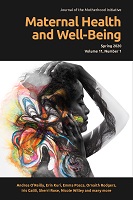“Good Mothers” Breastfeed: Discursive Constructions of “Good Motherhood” in Infant Feeding Health Promotional Material in Ireland
Abstract
This paper focuses on discursive constructions of “good motherhood” in discourses of infant feeding in contemporary health promotional material in Ireland. The study examines the multisemiotic composition of two pamphlets on breast and formula feeding, routinely given to mothers in Ireland after having a baby. These pamphlets are analysed using a model of multimodal critical discourse analysis (MCDA) in order to produce a comprehensive examination of the key discursive strategies and semiotic choices employed by the producers of these texts to influence parents’ decisions about infant feeding. The paper examines how mothers’ choices with regard to infant feeding are constrained by the positioning of breastfeeding as the optimal choice, and the discursive legitimisation of correlations between the practice of breastfeeding andthe ideal of good motherhood. It also highlights that these discursive strategies and semiotic choices are underpinned by discourses of attachment parenting, totalmotherhood and neoliberal risk culture.The paper argues that the health promotional texts which form the basis of this study, are part of a wider discourse of breastfeeding which is an ideologically infused moral discourse about what it means to be a good mother in an advanced capitalist society. It further concludes that the question of choice, which is central to so many women’s issues, is notably absent from the discourse of infant feeding, a factor that can have a strong negative impact on the wellbeing of new mothers.
Downloads
Published
How to Cite
Issue
Section
License
All intellectual property in relation to material included on this site belongs to the Motherhood Initiative for Research and Community Involvement (MIRCI). All material on this site is protected by Canadian and international copyright and other intellectual property laws. Users may not do anything which interferes with or breaches those laws or the intellectual property rights in the material. All materials on the Motherhood Initiative for Research and Community Involvement (MIRCI) are copyrighted and all rights are reserved. Any reproduction, modification, publication, transmission, transfer, sale, distribution, display or exploitation of the information, in any form or by any means, or its storage in a retrieval system, whether in whole or in part, without the express written permission of the Motherhood Initiative for Research and Community Involvement (MIRCI) is prohibited. Please contact us for permission to reproduce any of our materials. This site may include third party content which is subject to that third party's terms and conditions of use.


